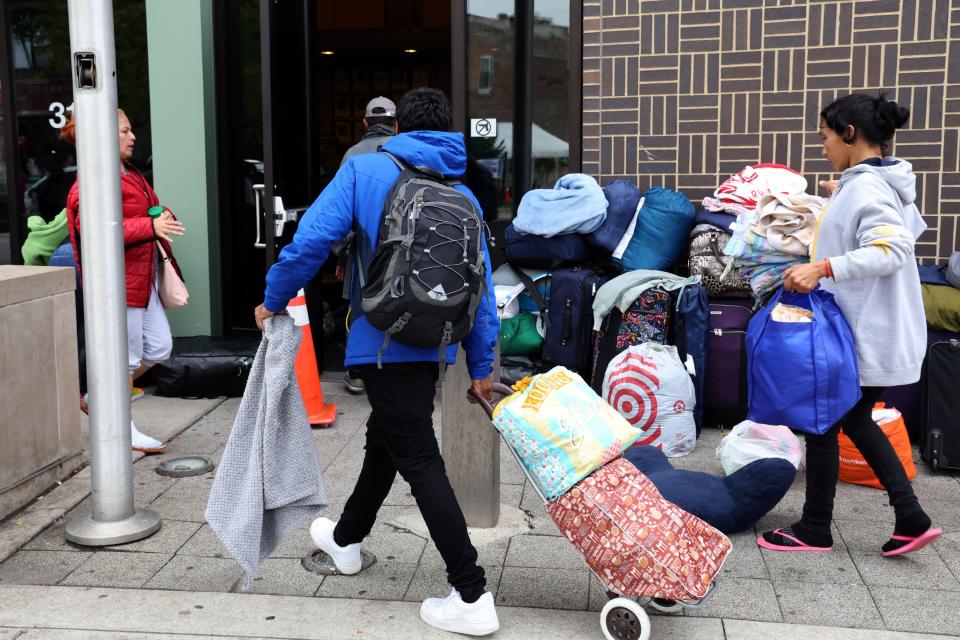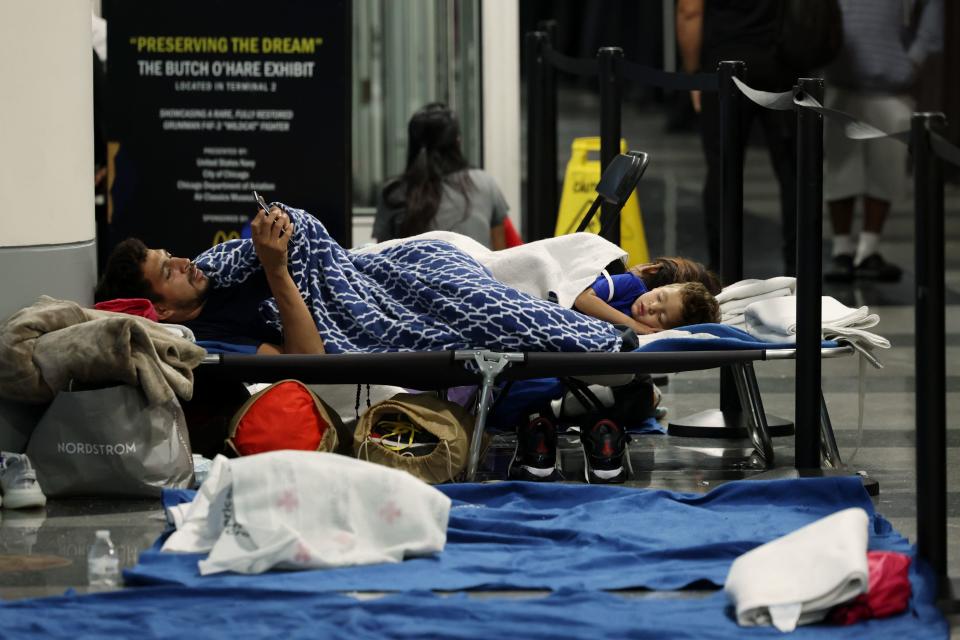Tension between city and state over migrant crisis on the rise — as are cost estimates
Mayor Brandon Johnson’s administration on Thursday defended his proposal to erect tent encampments for migrants arriving from the southern border amid mounting criticism of a security firm contracted for the plan and rising cost estimates for dealing with the steady stream of asylum-seekers.
During a briefing with reporters, Johnson’s deputy chief of staff, Cristina Pacione-Zayas, said the latest estimate of costs associated with migrants arriving in Chicago from August 2022 to the end of the year could reach $361.3 million, a whopping $58 million more than the previous projection.
With more than 1,800 migrants awaiting shelter placement while housed in Chicago police stations, and another 450 staying at the city’s airports, Pacione-Zayas indicated the administration is not backing down from its contract with GardaWorld Federal Services, which has been at the center of controversies over its handling of migrants elsewhere, and its subsidiary Aegis Defense Services to run “base camp” landing zones.
“GardaWorld can speak to the allegations. That’s not our job,” Pacione-Zayas said. “Our job is to ensure that they’re meeting our expectations, that there is a system of accountability and that we are going to operationalize that.”
When asked who will hold GardaWorld accountable for its work in the city going forward, Pacione-Zayas replied, “The mayor’s office.”
“There is an impression that there will be a less-than offering. There is an impression that these will be detention centers,” she said. “That is absolutely not the case. We are working with GardaWorld to ensure that we are centering the dignity, the respect and the humanity that these individuals absolutely deserve.”
Her remarks came the same day that Gov. J.B. Pritzker sought to distance himself from the city’s tent encampment strategy as well as from GardaWorld, even though City Hall’s $29.4 million agreement with the company was made possible by leveraging an existing master state contract.
The governor told reporters that he believes finding existing buildings to house asylum-seekers would be preferable to tents — concerns he said he has expressed to City Hall.
“If we have existing facilities, we ought to use all of those that are willing to do it,” Pritzker told reporters at an unrelated event in Chicago.
Pritzker acknowledged “a lack of existing buildings to put people in” but said he doesn’t think the tent encampment plan “is the only option.”
“We continue to have conversations about it,” he said.
Pritzker’s first public comments on the proposal, which Johnson unveiled with few details earlier this month, underscored the ongoing push-and-pull between city and state officials as the pace of migrant arrivals appears to be accelerating a year into the crisis.
In response to Pritzker, Ald. Carlos Ramirez-Rosa, the mayor’s floor leader, posted the most strident pushback against the state so far from a Johnson ally.
“This is particularly ludicrous coming from JB given that lack of meaningful support from the State of Illinois has pushed the city in this direction,” Ramirez-Rosa posted on X, the platform formerly known as Twitter. “New York state has opened multiple migrant shelters. The State of Illinois operates ZERO shelters. ZERO. Open some shelters JB!”
In his earlier comments, Pritzker touted the roughly $328 million the state has spent on the migrants to date and pointed to the state-paid rooms at a dozen hotels across the Chicago area that housed more than 2,000 migrants at the height of the effort late last year. But he also conceded, “That worked for a little while. It doesn’t work well for providing all the services that are necessary.”
The state on Friday is expected to announce how it will dole out $42.5 million in this year’s state budget allocated to help pay for migrant services.
Pacione-Zayas’ response to Pritzker’s lack of enthusiasm for the base camps hinted at tensions as well. “I would just say that we’re in a position right now, where expediency is one of the levers,” she said.
Chicago was able to quickly sign a contract with GardaWorld because the company late last year signed a $125 million master contract with the Illinois Emergency Management Agency. The agency has said the contract was awarded through competitive bidding.
While overall costs are ballooning, Pacione-Zayas said rates for another big migrant contractor, Favorite Healthcare Staffing, were renegotiated to save 20% in costs toward the personnel that run the city’s bricks-and-mortar shelters by allowing more local hires. The Johnson administration didn’t say how much money will be saved with the 20% cut.
Some aldermen and immigration advocates decried the city’s choice to work with GardaWorld after learning of its migrant-related projects and proposals in Denver, Texas and Canada, as well as the firm’s recent contract agreeing to relocate asylum-seekers from Florida under the direction of Republican Gov. Ron DeSantis, who’s running for his party’s presidential nomination.
The company has so far declined to comment to the Tribune about its contract in Florida as well as the Chicago contract, but it put out a news release last week asserting that its contract with DeSantis’ administration “remains inactivated.”
“GardaWorld Federal Services has supported migrant and vulnerable populations with critical services for over 20 years,” the statement read. “GWFS has provided shelter and site management services for vulnerable populations in response to all major U.S. natural disasters and declared emergencies since 2002.”
Efforts to find more bricks-and-mortar shelter for migrants have been slow. Records the Tribune obtained through open-records requests show city and state officials have been talking for months about opening a shelter at a former CVS store in the Little Village neighborhood, but a shelter — which preliminary plans show would house fewer than 300 people — has yet to open.
Though Pritzker on Thursday defended the state’s own deal with GardaWorld, he underscored that very little of that contract has been paid out to date.
“There aren’t many companies that provide the kinds of services” GardaWorld does, the governor said. “Remember, what we’re looking at mostly is we don’t have the kinds of facilities that they can provide in an emergency, right? We have some but not enough when you have a major undertaking like the city has.”
In the past decade, GardaWorld has received contracts across North America to provide migrant-related services that include detention. Critics say the company has worked with the federal government at Fort Bliss, a facility along the southern border in El Paso, Texas, that houses unaccompanied children who crossed the border. The company also has contracted with the Canadian government to “provide detention and transportation services” in the Vancouver area, according to a case study on its website.
In addition, the firm was one of three finalists in Florida for DeSantis’ plans to relaunch a program relocating migrants to Democratic-led cities, according to the state’s online records. GardaWorld signed the contract with Florida’s executive office of the governor in June, with amendments stretching to Aug. 17, though its statement last week said no services have been provided yet.
Immigration advocates in Denver helped sink a proposed $40 million contract to run migrant shelters there, the Denver Post reported.
Records obtained by the Tribune show members of Johnson’s administration raised questions about the firm as well. The city’s deputy mayor for immigration, Beatriz Ponce de León, shared the Denver Post article with state officials, telling them “We’d like to discuss possible implications here.”
Pacione-Zayas on Thursday was critical of Denver’s handling of migrants, saying “they’re doing exactly what Texas is doing.”
“People are going to Denver, and they’re putting them on buses and flights, including to Chicago,” she said. “So they can be as righteous as they want to be, but they have not taken the responsibility nor attempted to live up to their sanctuary status.”
Since the first new arrivals from southern border states in August 2022, Chicago has received 295 buses of migrants. Seven of them came from Denver, according to the city. The Denver mayor’s office did not immediately respond to a request for comment on Pacione-Zayas’ remarks.
The GardaWorld plan has drawn the ire of left-leaning groups in Chicago. The 33rd Ward Working Families, a progressive political group on the Northwest Side, issued a statement Wednesday saying that “the potential that these structures prove inadequate and leave people to the mercy of private police and soldiers is … troubling.”
“As an organization that publicly endorsed, canvassed and raised money for Mayor Brandon Johnson, we feel a responsibility to speak out about the recent plan to house asylum seekers in temporary structures that have to withstand the harsh reality of Chicago winters, and are built and administered by the private security contractor GardaWorld,” the organization wrote.
Pacione-Zayas said Thursday that the group “raised some very important issues,” and the administration will meet with its members.
Last week when Pacione-Zayas presented the Johnson’s administration’s first public defense of the GardaWorld contract during a “Good Evening with Pat Whalen” appearance, she too acknowledged the predicament posed by working with such a company.
“I mean, these are all terrible decisions. That’s the challenge,” Pacione-Zayas said.


